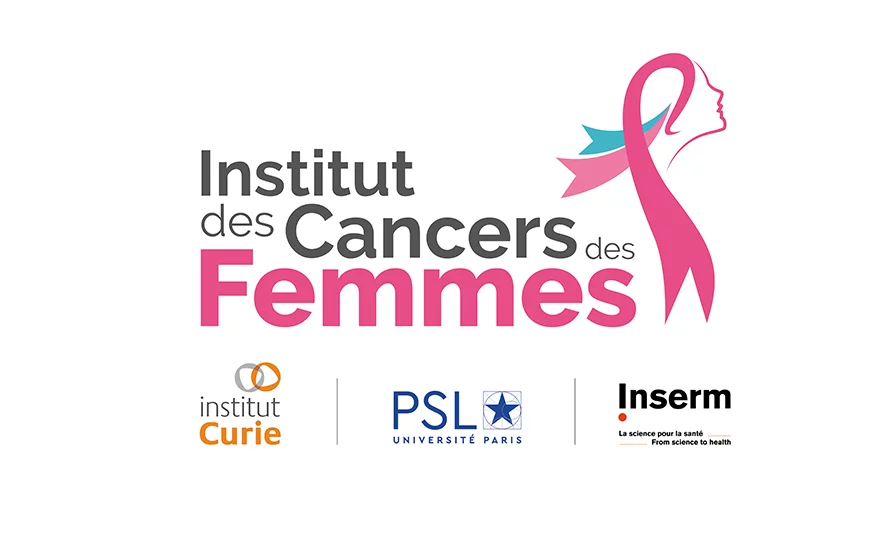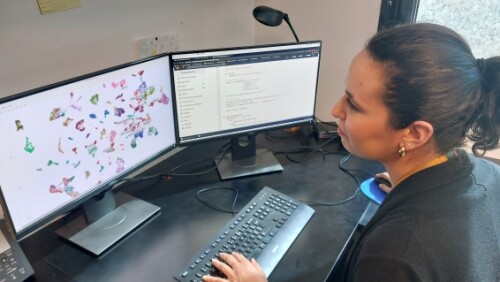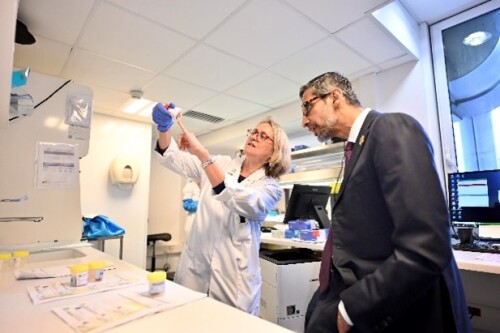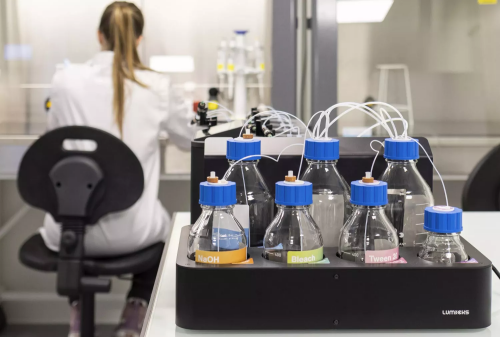Today, the Institute of Women’s Cancers, founded by Institut Curie, PSL University and Inserm, is up and running, and it has unveiled its ambitions and expansive program. Its goals are to deepen the understanding of women's cancers through multidisciplinary scientific excellence and develop holistic care for women with cancer based on two pillars: precision medicine in oncology and consideration of women's individual characteristics.
« Every year in France, almost 78,000 women are affected by female cancers, and unfortunately, 20,000 of them die from them.[1] This is still far too many, and reducing the number of deaths linked to breast cancer and gynecological cancers is a major challenge, particularly for cancers with a poor prognosis", says Prof. Anne Vincent-Salomon, Director of the Institute of Women’s Cancers. "The ambition of our new IHU is to leverage the expertise and multidisciplinarity of Institut Curie, PSL, and Inserm to provide holistic care for women with cancer, and to include patients in this integrated approach for a better quality of life. We strive to make discoveries in basic and clinical research that will drive innovation and revolutionize prevention and care. Researchers, clinicians, patients, engineers, caregivers, experts in the human and social sciences are all part of this project. Our ambition is to become the national reference center dedicated to women's cancers, and to launch a real social and human dynamic that goes beyond our IHU.”
With an initial budget of 20 million euros, financed as part of the France 2030 plan, the Institute of Women’s Cancers will be a driving force for further progress in the understanding, prevention, and management of women's cancers. Today, the IHU teams have designed a large-scale program bringing together 8 working groups around 19 innovative projects, particularly in gynecological cancers.
|
IN BRIEF > Smoother, more individualized and innovative care pathways > Understanding the biology of women's cancers to develop new diagnostic and therapeutic approaches - example of ovarian cancer > From the Women's Cancer Atlas to 3D organoids and tumors on a chip > Human and social sciences for prevention - the example of cervical cancer > The Women's Living lab: fostering a collaborative and societal spirit for innovation |
Smoother, more individualized, more innovative care pathways

At Institut Curie, women's cancer care is supported by high-level medical expertise, state-of-the-art technical platforms, and ongoing clinical trials. At the heart of this care, the Institute of Women’s Cancers is committed to personalizing, clarifying, and enhancing patient care according to their age, fragility, environment, and expectations. This commitment places a high priority on access to therapeutic innovations, but also on patients' quality of life. At the IHU, supportive care (psychological support, oncology wound care, sexual healthcare, nutrition, sports facilities, therapeutic education, acupuncture, etc.) plays a key role in patient care. In this respect, IHU teams are implementing original digital strategies to extend this supportive care and improve patients' quality of life, while also helping to improve caregivers' quality of life.
Because young women with cancer face specific medical and psychosocial challenges, the Institute of Women’s Cancers strives to set up a nationwide reference center for young women with cancer. This center will offer comprehensive care in oncogenetics and onco-fertility, including adapted supportive care, dedicated support for the impact on personal, sexual, and professional life, as well as connected devices (digital educational aids, remote monitoring, digital progress tracking). In addition, with the number of patients aged 70 and over rising steadily, IHU teams are strongly committed to setting up priority and highly specific onco-geriatric pathways for elderly women. This dedicated approach aims to set up clinical trials in this population, a common strategy for therapeutic de-escalation in various indications, and medical and economic studies measuring, among other things, the impact of new treatments on the well-being of elderly women.
Understanding the biology of women's cancers (breast cancer and gynecological cancers) to develop new diagnostic and therapeutic approaches - example of ovarian cancer

Age, pregnancy, menopause, obesity, genetic predisposition, environmental exposure, etc.: countless factors influence the evolution and adaptation of tumors over time, depending on treatment or location. Deciphering this complexity of life, essential to cancer treatment, requires researchers to be mobilized. Drawing on Institut Curie's recognized experience in this field, and the cutting-edge research carried out by teams at PSL University and Inserm, the IHU's aim is to revolutionize scientific understanding of women's cancers by exploring the emergence of these tumors, their spatio-temporal evolution, and by tackling the specificity of rarer, more complex tumors. Numerous projects in biology, genetics, epigenetics, chemistry, etc. will be carried out within the framework of the IHU to understand this complexity, identify new diagnostic and prognostic markers and new treatment avenues.
Among the many areas of research, work is underway to understand why immunotherapy is not effective in ovarian cancer, and to design therapeutic alternatives. Led by the team of Dr. Fatima Mechta-Grigoriou, Director of Research at Inserm and head of the Stress and Cancer team at Institut Curie, this work involves examining the role of the tumor microenvironment in treatment resistance. In particular, she is studying a cell population that could revolutionize oncology treatments: fibroblasts.
“Our work has isolated fibroblast cell populations that accumulate in aggressive cancers and are associated with resistance to immunotherapy in high-grade serous ovarian cancers. This research reflects the work we are carrying out as part of the Cassiopeia RHU, and we hope that it will lead to beneficial results for our patients in several years' time", enthuses Dr. Fatima Mechta Grigoriou.

For women with ovarian cancer, it is now essential to test for DNA repair defects in the tumor (HRD test). If the tumor has this "HRD" defect, the patient can be treated with PARP inhibitors. “These tests - the result of work carried out at Institut Curie - have made a significant contribution to the treatment of women with ovarian cancer. Today, the IHU will enable us to considerably accelerate our research and transform it into innovations and therapeutic applications for our patients, whether in terms of drugs, surgery, radiology... to treat gynecological cancers, including the rarest ones", enthuses Prof. Fabrice Lecuru, Head of the Gynecological Oncology Department at Institut Curie and Professor of Surgery, Université de Paris Cité. “We're also looking forward to collaborating with PSL teams to collect socio-demographic data, for example, which we can integrate into our clinical studies and improve our results".
Accordingly, the HoLOGRAM project, supported by MSDAVENIR, MSD France's healthcare research endowment fund and Europe's leading life sciences endowment fund, is about to get underway. Coordinated by Dr. Manuel Rodrigues, oncologist and researcher at Institut Curie, Prof. Fabrice Lecuru and Dr. Fatima Mechta-Grigoriou, this research focuses on low-grade serous ovarian cancers: rare tumors that affect young women, are poorly understood and for which there is no satisfactory treatment. HoLOGRAM aims to characterize cellular heterogeneity and cell-cell interactions within low-grade serous ovarian cancer tumors, to define the transcriptomic and genomic profiles of these tumors, and to identify new therapeutic options.
|
From Women's Cancer Atlas to 3D organoids and tumors on a chip
The cornerstone of the Institute of Women’s Cancers, the Women's Cancer Atlas will fuel most of the IHU's research, care and training activities. The Women's Cancer Atlas will provide an integrated, multi-scale (cell, tissue, individual), multimodal (taking into account multiple molecular, clinical, human and social science parameters) and longitudinal (at each stage of diagnosis, during or after treatment, or at the time of relapse) database. Over the next 10 years, this centralized reference database should include samples from over 35,000 patients, a precious resource that will enable us to better understand the initiation and biology of women's cancers, improve diagnosis and develop new therapeutic strategies for more effective treatment and relapse prevention.
Another structuring, cross-disciplinary and major project of the Institute of Women’s Cancers: a platform based on the development of 3D organoids and tumors on a chip will develop "biological avatars of patients". These "avatars", derived from biopsies, will be "cultured" in the laboratory and used to test the response of patients' tumors to different treatments and to study their evolution. Drawing on the strong interdisciplinary expertise of Institut Curie and IPGG Paris - PSL (microfluidics, cellular biology, physics, engineering, data), this platform will support patient care and help develop more appropriate treatments. |
AI to help diagnose and prognose female cancers
X-ray images, digital pathology, and multi-omics data (genomics, transcriptomics, metabolomics, etc.) now make it possible to build models that provide the basis for Artificial Intelligence tools. Thanks to teams from the Ecole des Mines de Paris and Institut Curie, the Institute of Women’s Cancers is positioning itself as a benchmark for the use of AI in oncology in France. Improving the diagnosis of gynecological and breast cancers through the development of "deep learning" algorithms, identifying predictive biomarkers and implementing these biomarkers and tools in clinical practice: the IHU is strongly committed to the development of innovative relapse detection methods and their concrete clinical implementation. It is in this disruptive field of AI that the first industrial partnerships supported by the IHU are taking place, a momentum at the heart of the Institute of Women’s Cancers strategy:
- The Institute of Women’s Cancers, a pioneer in digital pathology
Supported by MSDAVENIR, the leading private healthcare research partner in France, the BC-Digital Path project, led by Prof. Anne Vincent-Salomon, Director of the Institute of Women’s Cancers, aims to generate the largest image repository of whole breast cancer biopsy slides in Europe, with structured pathological and clinical data and in-depth multiomic characterization. This project is being carried out in compliance with current European regulations and the ethical rules governing patient medical data. The database will contain digitized histological slides of breast cancers from 15,000 patients treated at Institut Curie over a 6-year period. This large-scale database will enable AI algorithms to be trained to better characterize breast tumors within their microenvironment, and to address numerous clinical questions: diagnosis, prognosis, resistance to treatment.
- Automated diagnostic assistance
Several pathologists at Institut Curie are evaluating the performance of Cleo Breast, a diagnostic assistance solution developed by PRIMAA, a medtech company developing software to aid decision-making in cancer diagnosis. Cleo Breast AI software automatically identifies key biomarkers of breast tissue lesions on slides (with histological staining HE and HES - hematoxylin, eosin, saffron). The idea here is to Enable doctors to make more accurate diagnoses, more quickly.
Human and Social Sciences dedicated to prevention - the example of cervical cancer
"Today, Today, we have the means to eradicate uterine cancer, we have the vaccination strategy against HPV (human papillomavirus) and yet there are still too many women affected by this cancer. This alerts us to the importance of combining different sciences to prevent risks on all kinds of scales", says Dr. Coralie Chevallier, Director of Research at Inserm, and Director of the Evolution and Social Cognition research group at Ecole normale supérieure-PSL. In particular, the IHU aims to explore the SHS dimension in prevention along the lines of KIDIVAX, a project that assesses the impact in schools of educational actions aimed at improving young teenagers' understanding of vaccination, in relation to issues of confidence in science and scientific curiosity."
|
The Women's Living lab: a collaborative and societal spirit for innovation
The Living Lab at the Institute of Women’s Cancers: a unique meeting place where caregivers, doctors, patients, caretakers, researchers and students can exchange ideas and develop digital and technical innovations and care tools that will benefit patients with female cancers. “Thanks to the IHU's extensive network, our living lab will harness the strengths and skills of Institut Curie, PSL and patients' associations, all of which are needed to bring original ideas to life for patients," says Dr. Isabelle Fromantin, a nurse with a doctorate in science and head of Institut Curie's Wound and Scar Research Unit. This Women's Living lab will also be a structured venue for organizing equally innovative and varied training and courses (in science, popularization, the arts...), in a spirit of open popular universities. |
[1] Source INCa
*An IHU (Institut Hospitalo-Universitaire) is a consortium between a hospital, a University and a national research institute, with a high level of expertise dedicated to one field, labelled by the French state. It is a center of scientific and medical excellence that brings together teams of researchers, caregivers and companies around a clinical theme. These organisations are built on four pillars: research, care, training and industrial development. Their aim is to foster the development of translational research that directly benefits patients, by concentrating and pooling forces around a specific medical research theme.
TO KNOW MORE : ihu-cancers-femmes.org



